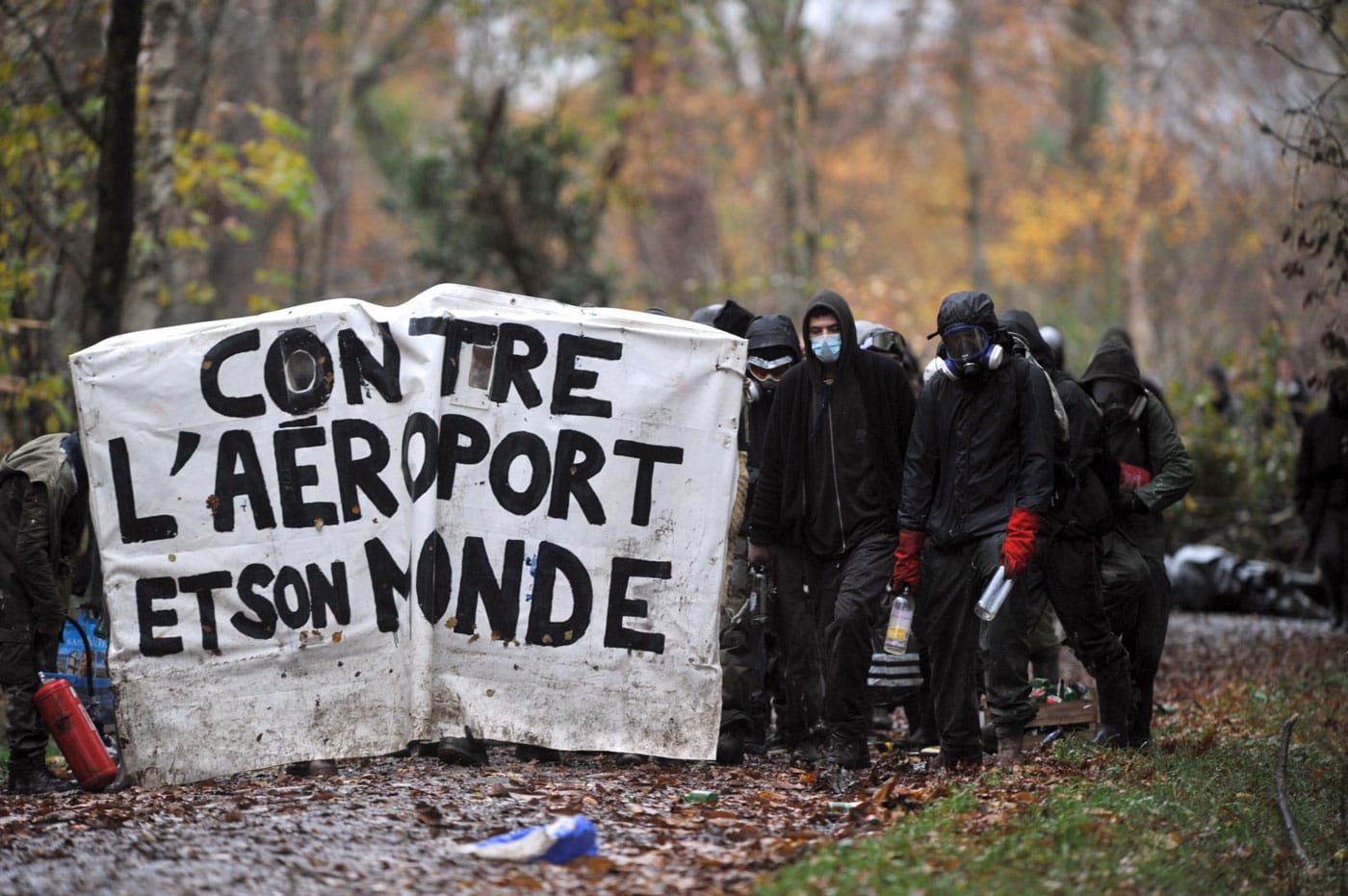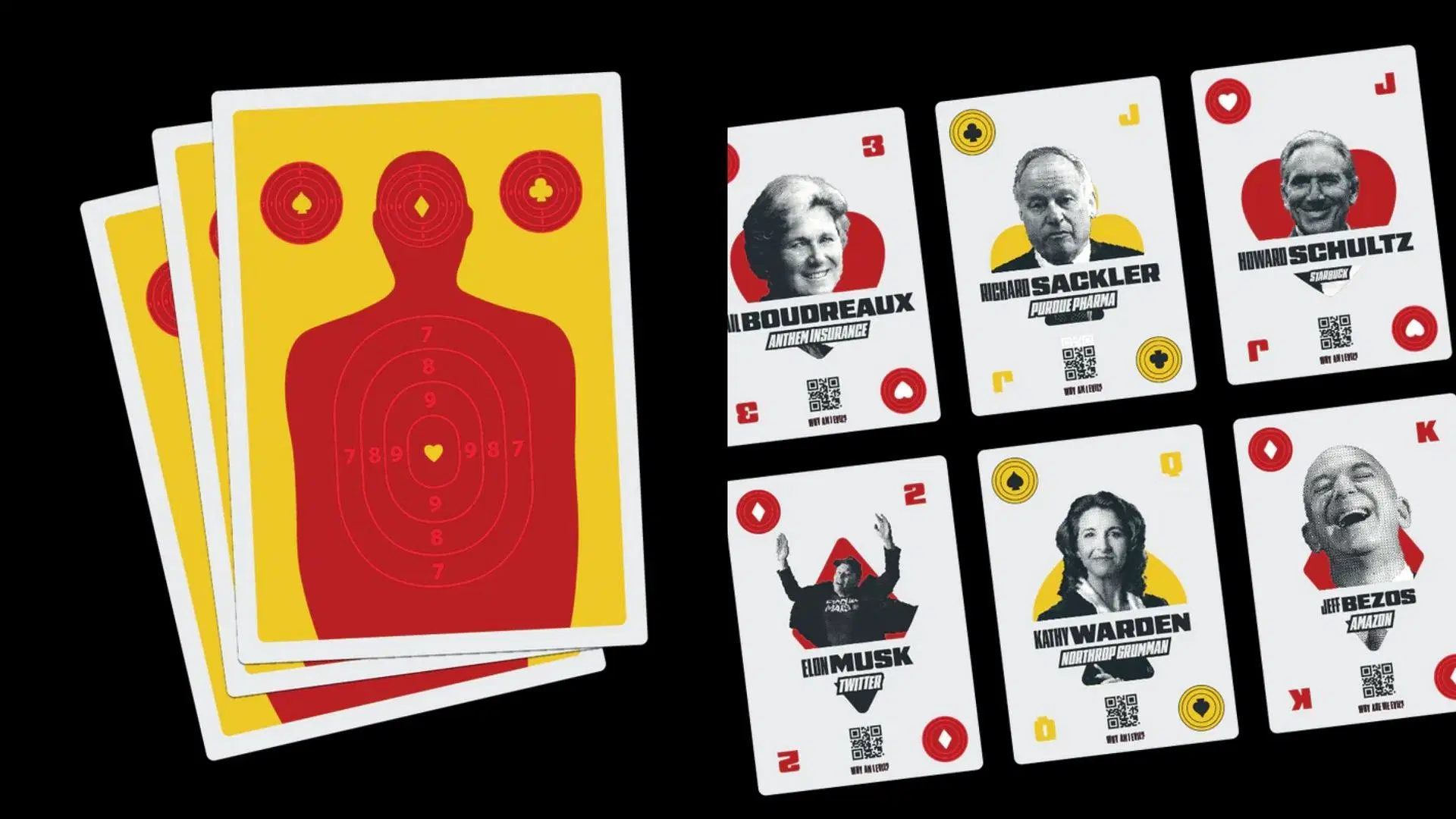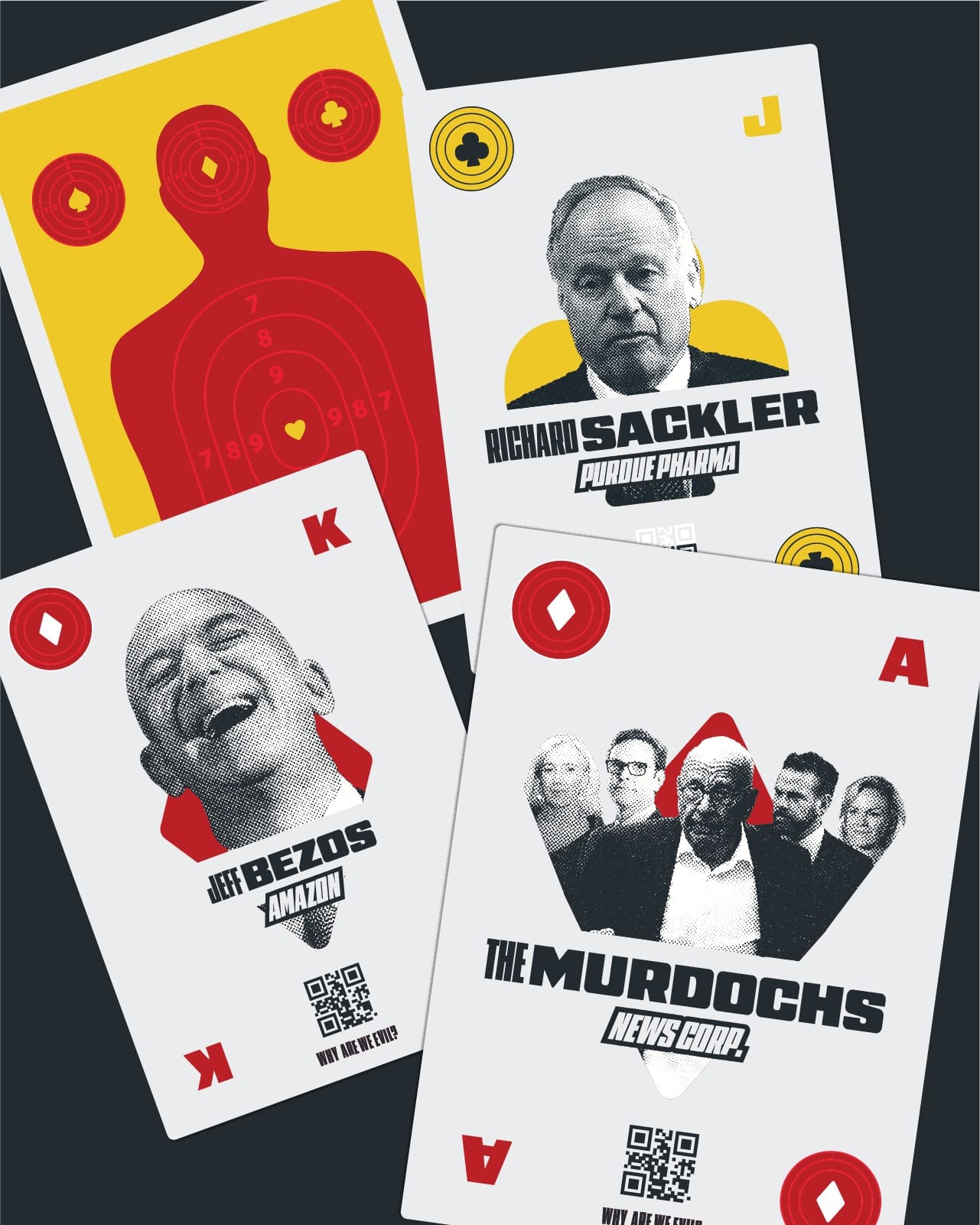Welcome to Dispatch #16! If it feels like the world is shifting under your feet sometimes, that’s because it is. This week we’re discussing Trump's tariffs, the large shifts happening in the global balance of power, a 50-year old land occupation in France, and how to adapt to these changing times. Let’s get into it!
First time reading our newsletter? Sign up to get them in your inbox!
Easy Actions to Take
Why: Leaked documents published on Jan. 23, 2025, expose a deep partnership between Israel’s military operations and Microsoft. We now know that Israel’s military used Microsoft’s cloud platform (Azure) alongside a “suite of communications and messaging systems” and millions of dollars of engineering support to carry out Israel's massive attacks on Gaza. Organized by MPower Change
Why: 15 Palestinian first responders were found in a mass grave in Gaza on March 23 — executed by the Israeli occupation forces while trying to save lives. The International Association of EMTs and Paramedics (IAEP), which claims to protect emergency responders, has said nothing. This silence is not neutral. Organized by CodePink
Why: The House just passed an extremely oppressive Voter Suppression bill that will take away voting rights from tens of millions of immigrants, women, elderly, POC, and more. This is a clear attempt at manipulating voter rolls ahead of the mid-term elections next year. The SAVE Act progresses to the Senate soon. If it passes the Senate, it will become law.
Little (Movement) Wins

The 50-Year Struggle of the ZAD
Revealing History
After 50 years of struggle, 10 years of physical occupation and over 11,000 canisters of tear gas, one of France’s most well-known social movements made a surprising achievement: they won. The fight first began in 1968 after the French government devised a plan to build a new airport in the rural commune of Notre-Dame-des-Landes. Local farmers and environmentalists opposed the project and local resistance gradually grew into full blown occupation by 2009 when, after a week-long Climate Action Camp, farmers and activists created the Zone à Défendre — or Zone to Defend, aka the ZAD.
Conflicts with the government continued for years, but a combination of mass mobilizations, legal action, and political conditions kept the government at bay. In October 2012, the French government launched Opération César in an attempt to evict the ZAD residents. Activists called on local support and 40,000 people showed up to re-occupy the land. After that first victory, the ZADistes (as they called themselves) went on the offensive. They staged mass protests in Nantes and other nearby cities, blocked key roads, and expanded their coalition, quickly becoming a constant thorn in the government’s side. Finally, on January 17, 2018, then-Prime Minister Edouard Philippe announced that the airport project at Notre-Dame-des-Landes was officially canceled - Victoire!
The struggle continues at the ZAD, but it has evolved from a phase of outright militant confrontation to subtler bureaucratic navigation. There are many important lessons to learn, but a few we think are particularly worth noting:
- Wide Coalition, Common Enemy - The ZAD was a motley crew of rural farmers, urban professionals, young radicals, and more moderate activists. While normally they may not associate with each other, they were united against a common enemy: the airport project. They welcomed anyone into the ZAD and this common enemy offered a clear target to rally against.
- Variety of Tactics, Constantly - ZADistes combined militant action like mass protests, road closures, and destroying infrastructure with less glamorous tactics like filing constant legal appeals to slow down the construction process. They leveraged the internet to spread their message widely and garner popular support while dispelling government propaganda.
- Proposed Alternative - The ZAD became an experiment in self-organized communal living, horizontal-leadership structures, and politics based on solidarity and freedom which inspired the thousands of people living in the ZAD. There were dozens of housing collectives comprised of make-shift dwellings, a bakery, a cheese factory, farming cooperatives, a hip-hop music studio, a library, the local radio station Klaxon, the ZAD’s own local newspaper, and venues for social gatherings. Residents organized work as volunteers and through cooperatives, formed committees to manage internal conflicts and made decisions unanimously at a General Assembly.
- Prepare for Victory - The cancellation of the airport project was a great victory but also required a change in tactics. The resistance at the ZAD evolved from outright opposition to an effort to navigate the French bureaucracy to make the ZAD more permanent. Without proper preparation, or even a united political vision, such moments can cause division in a movement.
- Share Knowledge - The struggle at the ZAD at Notre-Dame-des-Landes has inspired similar movements and experiments in alternative living across Europe and ZADistes did not keep their lessons secret. They created a communal gathering space called l’Ambazada and invited comrades from other movements like the Zapatistas, Landless Workers Movement, and Basque independence Movement to share knowledge and build international coalition.
📗 Learn More
The People's Dictionary: Dunning-Kruger Effect
First described by David Dunning and Justin Kruger in 1999, the Dunning–Kruger effect is a cognitive bias in which people with limited competence in a particular domain overestimate their abilities. For example, many in current Western society, especially America, believe that being good at running a business (ie, being a billionaire) means also being successful in managing the economy or creating a more efficient government.
Trump's Tariffs & the End of American Dominance
Connecting the Dots
Have you gotten sick of the economic roller coaster yet? 🎢 In case you’ve had trouble keeping up, here’s a quick summary:
- On April 2, the US announced historic and sweeping tariffs for nearly every country on Earth.
- The US stock market crashed hard, erasing billions from the retirement and savings accounts of working class Americans.
- On April 9 (a week later), Trump announced a pause on all his tariffs for 90 days, with the exception of one country, China. Right before this announcement, Trump posted on Truth Social - his social network - telling his followers “to buy.”
- The stock market instantly rebounded and the wealthiest Americans instantly gained $304 Billion in wealth in 1 day, the largest amount ever recorded according to Bloomberg Billionaires Index.
- The US continues to escalate a trade war with China by applying 125% tariffs. Now a matter of national pride, China has responded with tariffs of their own and restrictions on rare Earth mineral exports.
Many have pointed out the economic impacts, but to us the tariffs will only accelerate much larger changes happening to the global world order; changes which could genuinely alter the course of history for the next century. If that all sounds a bit lofty, let’s back up a bit.
A bit of historical context
There’s no denying that the United States has had a fantastic 20th century, overtaking the British Empire and beginning an age of Pax Americana (a time when the US is the dominant global economic and military superpower). During this time, the world has been rapidly going through a process called globalization in which the different economies, cultures, and politics of various nations around the world become more and more integrated. This is a process that has been happening for centuries, since merchants were crossing oceans to trade in faraway places, and in many ways it’s the natural result as technology advances and communication and travel become easier. It’s a process that’s neither inherently good or bad, but for the last ~80 years globalization has been led by the US and other Western “First world” nations which does have some very real consequences.
Speaking of – the “Three-World” model for categorizing world nations was first coined in 1952 by a French philosopher named Alfred Sauvy to describe the new global paradigm post-World War 2. Western colonial capitalist nations comprised the First World, the communist Eastern Bloc nations made the Second World, and everyone else (primarily formerly colonized nations in the Global South) made up the Third World. While the model was originally conceived as an analogy for the nobility, clergy, and commoners of pre-revolutionary France, it’s become a rough outline of the expected global world order after formerly colonized countries gained independent after WW2. Of course, the imperial systems that the British built were never fully dismantled, they just changed owners and evolved. Instead of outright domination, the Empire would assert its control in more subtle ways - the nations of the Global Majority could have their independence, as long as capital still flowed in the “right” direction.
The idea since WW2 has been to create a type of economic globalization where the richer countries of the First world would design, code, and develop goods while the poorer (aka disenfranchised) nations of the Third world manufactured, labored, and sold their resources. That’s why iPhones are “designed in Cupertino, California” (First World), but manufactured in China (Second World) with raw materials sourced from the Congo (Third World). In reality, the nations of the Third world aren’t poor, they’re quite rich in both human and natural resources, but the idea being sold is that both would still be used in the service of the First world. This system is what many have called neocolonialism - the same effects of colonialism, but adapted to the changing modern times.
Global financial institutions like the International Monetary Fund and World Bank were created to fund the development of less-developed nations, as long as they bought into the Western free-market system and followed Western economic plans. In the power struggle after WW2, newly independent nations had a choice: Join the American system and go along with their plans, or take control of their own resources and find another way to develop their country. Many tried the latter, but were either met with military coups (in the case of most of Latin America) or crippling economic sanctions (in the case of Cuba, Venezuela, Iran, and others).
So what does this all have to do with tariffs?
Well, the 21st century is turning out to be very different than the 20th. It turns out the United States miscalculated. Second and Third world countries have actually gotten quite good at designing things too, and even better at playing the global capitalist game the US started. They’re also catching up fast. China, in particular, has been able to catch up to the West, now leading the world in EV, solar, AI, and other advanced technologies. BRICS, the new economic alliance made up of former Second and Third world countries, now surpasses the US and other First world countries in global economic output. The First world is no longer the only or even biggest player in town.
Trump’s tariffs, whether paused or not, are a wake-up call to many and only accelerate the decline of the US as the leading superpower of the world. Perhaps 50 years ago this sort of strong-arming could have worked, but things are different now. When a developing country needs to build a road, railway, or factory, there are other options. It’s a fundamental shift in how the world has operated. Right now nations around the world are forming new bonds away from the US. China, South Korea, and Japan have even put aside generations of deep hatred and agreed to work together against the tariffs. The EU and China are also forging new economic bonds to push back against the US. China already represents the primary trading partner for most of the planet.
The thing is, the United States could absolutely adapt to this new reality, but that requires some really deep introspection. Trump is correct that the US has a national debt problem, but the issue isn’t immigrants taking American jobs or other countries exploiting the US - it’s billionaires and military industrial contractors draining the country’s finances and running it into the ground. Even as social services are cut, mass layoffs are conducted, and stock markets tumble, Republicans are preparing to pass a budget bill that will exempt the richest Americans from paying $4 Trillion in taxes, and Trump recently announced an increase of the military budget to a staggering $1 Trillion. As many of us have learned in life, the first step to solving a problem is admitting you have one in the first place, but the leaders in charge are a long way from doing that. Instead, the US will lash out, at everyone, and we’ll all feel the brunt of the US Empire’s slow collapse.
During times of monumental change and crisis, power is up for grabs. When the status quo proves to no longer be working, it’s a chance both the Left and Right to offer alternatives. As the US struggles to grip with the changing times, the Republicans offer attractive narratives of a past golden age and deploys fascistic policies to crush dissent. American Democrats have proven themselves too compromised by corporate interests to pose any real opposition. International readers will surely notice similar patterns in their own countries. This is the chance for the Left everywhere to offer an alternative path that can lead us more smoothly into an equitable world. We have to get into the fight, but the fight can take many forms.
- Organizing creative militant resistance against weapons manufacturers and other capitalist structures
- Boycotting corporations and investing into a solidarity economy
- Volunteering for local mutual aid efforts or local political office
- Build artistic experiences that help people imagine alternative systems
- Create conversation and bring more people into the fold
- Forging international bonds with other activists abroad
The world is changing, and it’s up to us to make sure it’ll end up better than before.
“Every crisis, actual or impending, needs to be viewed as an opportunity to bring about profound changes in our society. Going beyond protest organizing, visionary organizing begins by creating images and stories of the future that help us imagine and create alternatives to the existing system.”
Artists Confronting Inequalities
James Harr is a NYC-based graphic designer creating opportunities for learning, community development, and organizing towards liberation through apparel and product design.
Shortly after the United Healthcare CEO shooting, James shared a new product concept called the “Most Wanted CEO Playing Cards” with an empowering message for the US working class: know your enemies. Designed to satirize the infamous “Most Wanted” playing cards the US government often use in combat to help soldiers remember the names, faces, and titles of wanted individuals in case they ran into them in the field, James designed his cards to spotlight corporate CEOs from various industries (Real Estate, Retail, Healthcare, Finance, Tech, Weapons, Oil, Pharmaceutical, Chemicals, Agriculture, & Logistics) paired with a QR code that led to a webpage exposing their crimes against working-class people and our planet.
In the aftermath of the shooting, his work struck a panic nerve with officials and the response was swift. His cards appeared in press conferences with city officials, the NYPD and FBI wanted to speak with him, TikTok and Instagram de-platformed him, and Shopify removed his webstore. He has since joined forces with worker cooperative, Means, to produce his apparel and products. While his work never called for direct action, the cards were a powerful reflection of the present moment and an invitation to working-class people to continue connecting the dots on who is really disenfranchising them; a reminder of the true power of art.
Follow James on Means Workwear's Instagram
Resources & Tools
Please share these links with anyone that might find them helpful:
- 🧩 Blueprints for Revolution | A comprehensive practical guide to help you learn how to start getting revolutionary, wherever you are in the world.
- 🧩 The Direct Action Guide | A step-by-step guide on organizing and carrying out creative protest actions.
- 💸 Bank Green | Check your bank’s complicity and find alternative banks that invest in clean energy, local communities and progressive causes.
- 🖥 Open Secrets: Track US Election Spending | An online tool to find what groups are funding US Representatives.
- 🖥 Cryptpad | An open source office suite with end-to-end encryption that's a great alternative to Google's Office Suite.
- Need a dose of hope? Read this great a great article by longtime activist and organizer, George Lakey: “In times of rapid change, victory comes to those who train for it”
SUBMIT A RESOURCE!
Know of a helpful resource that more people need to hear about?
Submit it HERE.
If you're new here, don't forget to sign up to get the next Dispatch emailed to you. Till then, take care, stay safe, and stay strong. Life is rough now for many, but remember we always have each other.
Onward to the World We Deserve,
Elisa & Ray
Uplift The Conscious Citizens
- Like the newsletter? Tell a friend to sign up for the Conscious Citizens or share what you think about us on your social media and tag us!
- Wanna give a lil’ love? Grab us a coffee.
- Stay in our orbit! Follow us on Instagram and Bluesky.
If you have the means, reciprocate the love and become a paid member! The more support we get from our community, the more time we are able to dedicate to making activism & community care more approachable to people around the world.
About Little Wins Studio
Founded by Elisa & Ray, Little Wins is a Los Angeles-based creative communications studio using the power of multimedia design & storytelling to raise our collective consciousness, connect communities across cultures and classes, and motivate others to improve our world. We do this because we want to see a more engaged, liberated, and regenerative world where all people have access to the knowledge and tools needed to thrive.



